Be Fruitful and Multiply Bible Verse Meaning: Growth
The biblical phrase “Be fruitful and multiply,” found in Genesis 1:28, carries profound theological and historical significance. Commanded by God to Adam and Eve, it underscores human responsibility in procreation and stewardship.
In the original Hebrew, ‘peru u’revu’ signifies growth and increase, aligning with ancient Near Eastern cultural values of lineage and community continuity. Modern interpretations expand this directive to include ethical, social, and environmental stewardship, reflecting a holistic view of spiritual and communal flourishing.
Genesis 1:28 remains deeply relevant today, providing insights into the divine mandates for human responsibility and community development. Continue to uncover its broader implications.
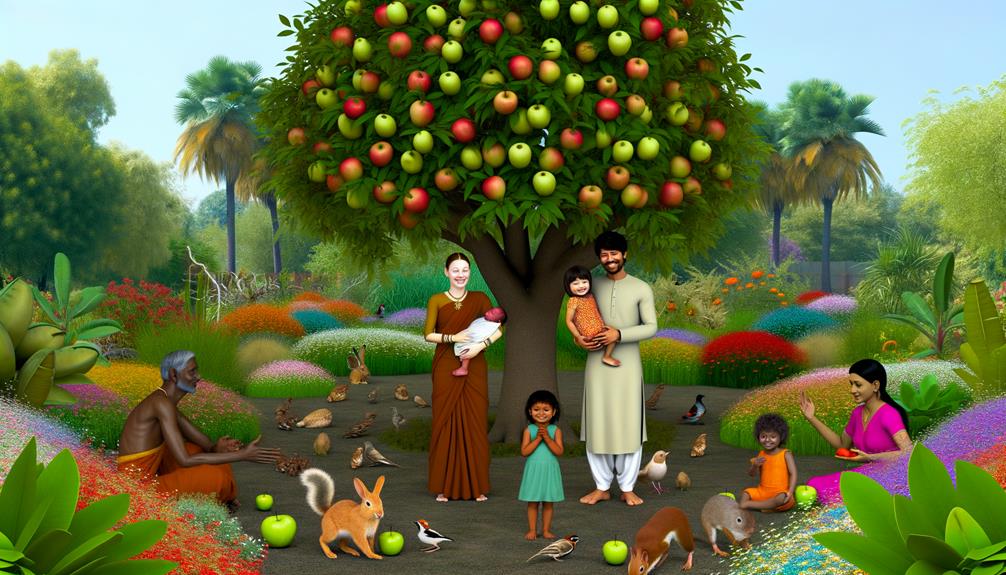
Be Fruitful and Multiply Bible Verse Meaning: Divine Blessing and Purpose
| Aspect | Details |
|---|---|
| Bible Verse | Genesis 1:28, Genesis 9:1, Genesis 35:11 |
| Full Verse | “God blessed them and said to them, ‘Be fruitful and multiply, fill the earth and subdue it.’” (Genesis 1:28) |
| Biblical Context | First commandment given by God to humanity after creation |
| Literal Meaning | A directive to reproduce, fill the earth, and establish human civilization |
| Spiritual Meaning | Represents God’s blessing for growth, productivity, and flourishing in all areas of life |
| Moral Reflection | Encourages responsibility, not just in reproduction but in nurturing life and creation |
| Symbolic Interpretation | Growth and multiplication extend beyond physical to spiritual, emotional, and societal development |
| Connection to Stewardship | Includes caring for the earth, managing resources, and cultivating healthy relationships |
| Application in Faith | Applies to spreading faith, good works, and positive influence in communities |
| Philosophical Insight | Reflects humanity’s role as co-creators with God, fostering life and purpose |
| Modern Application | Encourages personal growth, leadership, community building, and environmental stewardship |
| Related Verses | John 15:5 (Bearing spiritual fruit), Matthew 28:19 (Great Commission) |
Biblical Origin
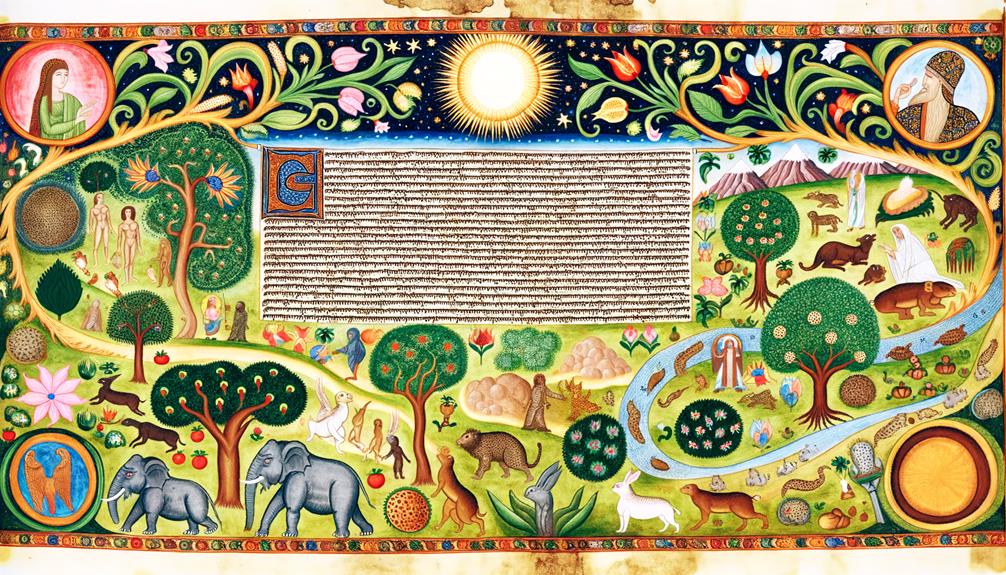
The phrase ‘Be fruitful and multiply‘ originates from the Book of Genesis in the Bible, specifically in Genesis 1:28, where God commands Adam and Eve to procreate and fill the earth.
This directive is embedded in the Creation narrative, indicating its foundational significance in Judeo-Christian theology. The command follows the creation of humankind in God’s image (Genesis 1:27), emphasizing human responsibility in stewardship and continuation of life.
Historically, this verse has been interpreted as a divine endorsement of family and propagation. It also highlights the role of humans in God’s plan, situating procreation as a sacred duty.
The historical context underscores its relevance in ancient agrarian societies, where population growth was essential for survival and prosperity.
Textual Analysis
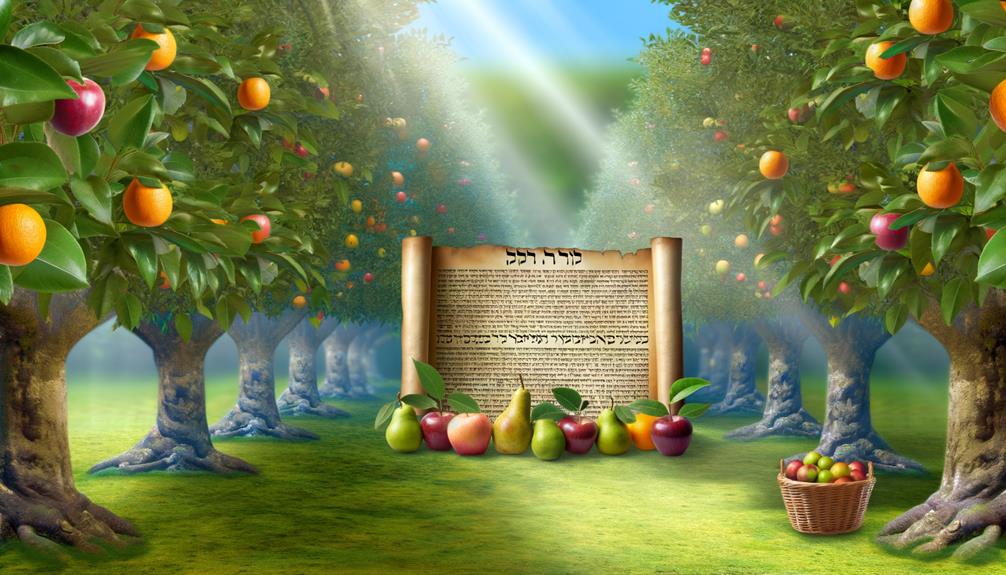
In examining the phrase ‘Be fruitful and multiply‘ from Genesis 1:28, it is essential to reflect on the original Hebrew context, where ‘פרו ורבו’ (peru u’revu) carries both literal and cultural connotations of growth and expansion.
Modern interpretations often explore this directive beyond its procreative implications, pondering its relevance in ethical, social, and environmental stewardship.
Historical context reveals its primary function in the ancient world, emphasizing population growth and dominion over the Earth as a divine mandate.
Original Hebrew Context
Understanding the phrase ‘Be fruitful and multiply‘ necessitates a close examination of its original Hebrew text, specifically the words ‘פְּרוּ וּרְבוּ’ (peru u’revu), as found in Genesis 1:28.
The verb ‘peru’ stems from the root ‘פרה’ (parah), meaning to be fruitful or to bear fruit, while ‘u’revu’ derives from ‘רבה’ (ravah), indicating an increase or multiplication.
These terms underscore a divine imperative for propagation and growth. Historically, this mandate is given to humanity immediately after creation, signifying not only biological procreation but also the expansion of human influence and stewardship over the earth.
The contextual analysis reveals a profound theological directive that intertwines human responsibility with divine blessing.
Modern Interpretations
Modern interpretations of the phrase ‘Be fruitful and multiply’ often explore its multifaceted implications beyond mere biological reproduction, delving into its spiritual, ethical, and societal dimensions as reflected in contemporary theological scholarship.
Analyzing Genesis 1:28, scholars argue that the phrase may symbolize the cultivation of virtues and the proliferation of ethical deeds. This interpretation suggests that humanity’s role is not only to populate the earth but also to nurture a world grounded in moral principles and responsible stewardship. In light of this, the phrase ‘first will be last explained‘ can be understood as a call to prioritize the well-being of others over self-interest, embodying the very virtues that lead to a just society. Therefore, the mandate to “be fruitful and multiply” transcends mere reproduction, inviting a deeper commitment to ethical living and community-building.
Historical context reveals that ancient Israelite society valued community growth and stewardship over creation.
Ecclesiastical writings, such as those by Augustine and Aquinas, support this broader understanding, emphasizing moral and spiritual fruitfulness.
Modern theologians also link the command to social justice, urging communities to foster environments conducive to holistic human flourishing.
This layered interpretation underscores the enduring relevance of the biblical mandate.
Historical Context
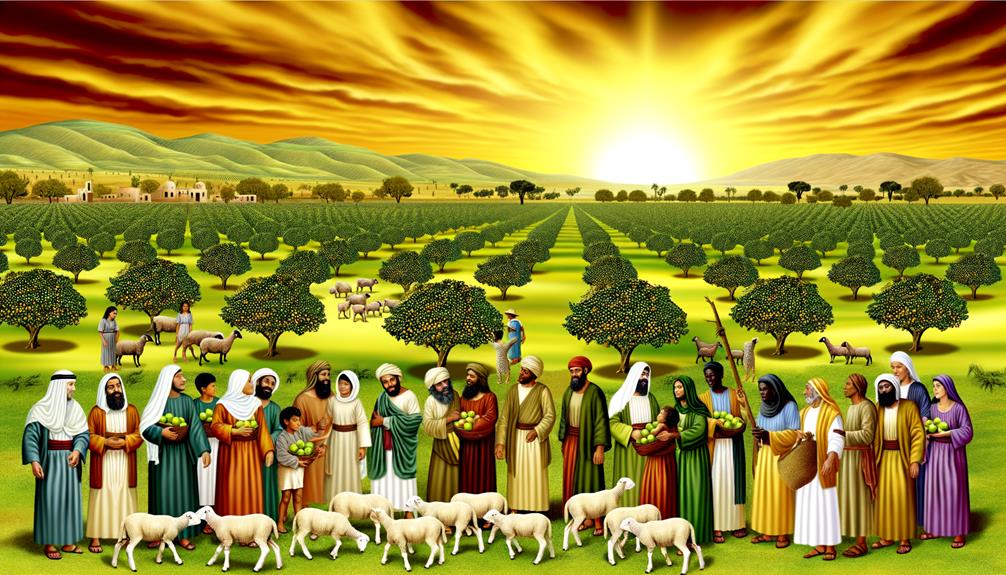
The command to ‘be fruitful and multiply,’ as seen in Genesis 1:28, must be understood within the framework of ancient Near Eastern cultural practices where procreation was integral to societal growth and survival.
Early biblical interpretations by Jewish scholars underscore the importance of this directive in establishing familial and tribal continuity.
Examining the historical milieu of this period reveals that fertility and expansion were not merely biological imperatives but also carried significant theological and communal implications.
Ancient Cultural Practices
In ancient Mesopotamian societies, the directive to ‘be fruitful and multiply’ found in Genesis 1:28 resonated deeply with the prevailing cultural values that emphasized fertility and the expansion of familial lineage. This biblical exhortation intertwined with ancient practices in several key ways:
- Agricultural Reliance: Fertility was essential for sustaining agriculture-based economies, directly impacting survival and prosperity.
- Patriarchal Structures: Lineage and inheritance were central, with offspring ensuring continuity of family lines and property.
- Religious Observances: Many deities symbolized fertility, and rituals often sought divine favor for prolific reproduction.
- Legal Codes: Ancient laws frequently addressed family growth, inheritance rights, and the duty to produce heirs.
Understanding these practices illuminates how Genesis 1:28 was more than a spiritual command; it was a socio-economic imperative.
Early Biblical Interpretation
Examining early biblical interpretation, scholars uncover how Genesis 1:28 was understood within the historical contexts of ancient Israel and surrounding cultures.
In the verse, ‘Be fruitful and multiply,’ the directive was not merely for individual reproduction but held communal implications. Ancient Israel viewed procreation as a divine mandate essential for societal stability and continuity (Genesis 9:1).
The command also reflected agricultural metaphors prevalent in neighboring cultures, linking fertility with prosperity. Furthermore, the emphasis on multiplication resonated with the patriarchal lineage system, where progeny guaranteed the preservation of family heritage and divine promises (Genesis 17:6).
Consequently, early interpretations intertwined theological, cultural, and socio-economic dimensions, underscoring the verse’s multifaceted significance in the ancient Near Eastern milieu.
Theological Perspectives

Although interpretations vary, many theologians agree that the command to ‘be fruitful and multiply’ (Genesis 1:28) extends beyond mere procreation, encompassing broader themes of stewardship, communal growth, and spiritual flourishing. This holistic view is rooted in scriptural and historical contexts, highlighting humanity’s role in God’s creation.
Theologically, this command can be understood through:
- Stewardship: Genesis 2:15 emphasizes humanity’s role in caring for creation, aligning with the broader interpretation of ‘fruitfulness’.
- Communal Growth: Acts 2:42-47 illustrates early Christian communities flourishing in faith and fellowship, embodying the command’s communal aspect.
- Spiritual Flourishing: John 15:5 speaks to bearing spiritual fruit, indicating growth in faith and discipleship.
- Cultural Mandate: Historical context shows the command promoting cultural and societal development, reflecting God’s creative intent.
Procreation and Family

While the broader interpretations of ‘be fruitful and multiply‘ encompass stewardship and spiritual growth, the directive also fundamentally addresses the importance of procreation and the establishment of family units within the biblical narrative.
In Genesis 1:28, God commands Adam and Eve to ‘be fruitful and multiply,’ emphasizing the creation of human life as a divine ordinance. This command reflects ancient Near Eastern cultural values, where lineage and familial bonds were essential for societal stability and continuity.
Additionally, the biblical emphasis on family is reiterated in passages like Psalm 127:3-5, which celebrates children as a heritage from the Lord. Historically, these directives fostered community growth and guaranteed the perpetuation of faith and traditions across generations.
Spiritual Interpretations

The directive ‘be fruitful and multiply’ extends beyond its literal meaning to encompass profound spiritual interpretations that emphasize growth in faith, virtue, and the expansion of God’s kingdom. This command, found in Genesis 1:28, serves as a metaphorical call to propagate spiritual values and divine principles.
Historically, theologians have interpreted this mandate to include:
- Evangelism: Spreading the Gospel and making disciples (Matthew 28:19).
- Spiritual Growth: Cultivating personal faith and holiness (Galatians 5:22-23).
- Community Building: Strengthening and nurturing church communities (Acts 2:42-47).
- Charitable Acts: Demonstrating love and kindness through service (Matthew 25:35-40).
These interpretations underscore a holistic approach to spiritual multiplication, aligning with God’s overarching purpose for humanity.
Moral Implications
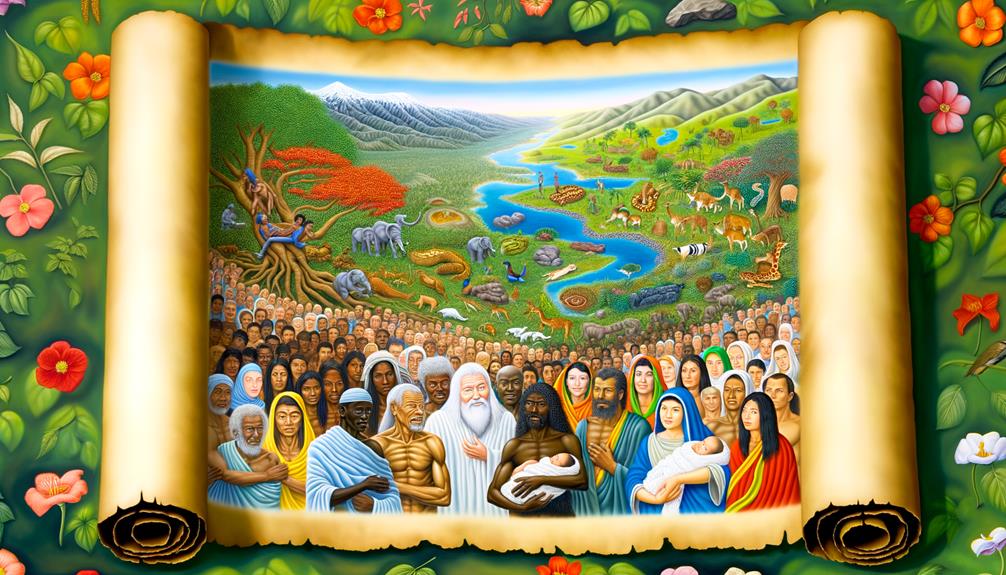
In examining the moral implications of the directive ‘be fruitful and multiply,’ one must consider its impact on ethical decision-making within the context of family, society, and stewardship of creation, as outlined in various biblical passages.
Genesis 1:28 encourages procreation, establishing it as a divine mandate. Historically, this directive reinforced patriarchal family structures, emphasizing lineage and inheritance.
Ethical considerations also arise in balancing population growth with responsible stewardship of Earth’s resources, as suggested in Genesis 2:15, which calls for humans to ‘tend and keep’ the Garden of Eden.
Consequently, the moral weight of this directive necessitates a nuanced approach, integrating respect for creation with the perpetuation of human life, ensuring that both are harmoniously aligned with divine intent.
Modern Relevance
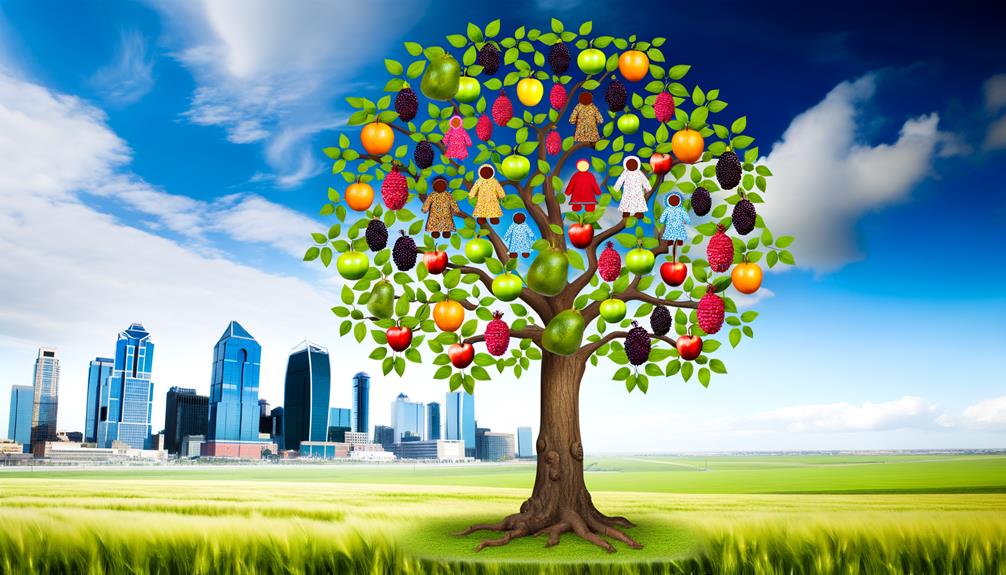
Understanding the directive to ‘be fruitful and multiply’ within a modern context necessitates an exploration of its application amidst contemporary ethical, environmental, and societal challenges.
Scriptural references, such as Genesis 1:28, historically emphasized population growth as a divine mandate. However, today’s context requires nuanced interpretations, considering:
- Ethical Concerns: Balancing family planning and moral responsibilities.
- Environmental Impact: Addressing overpopulation and sustainability.
- Societal Structures: Redefining family roles and gender equality in light of ancient directives.
- Technological Advances: Understanding reproductive technologies within a biblical framework.
These factors necessitate a reevaluation of the ancient command to align with modern values, providing a thoughtful balance between scriptural fidelity and contemporary relevance.
Personal Applications
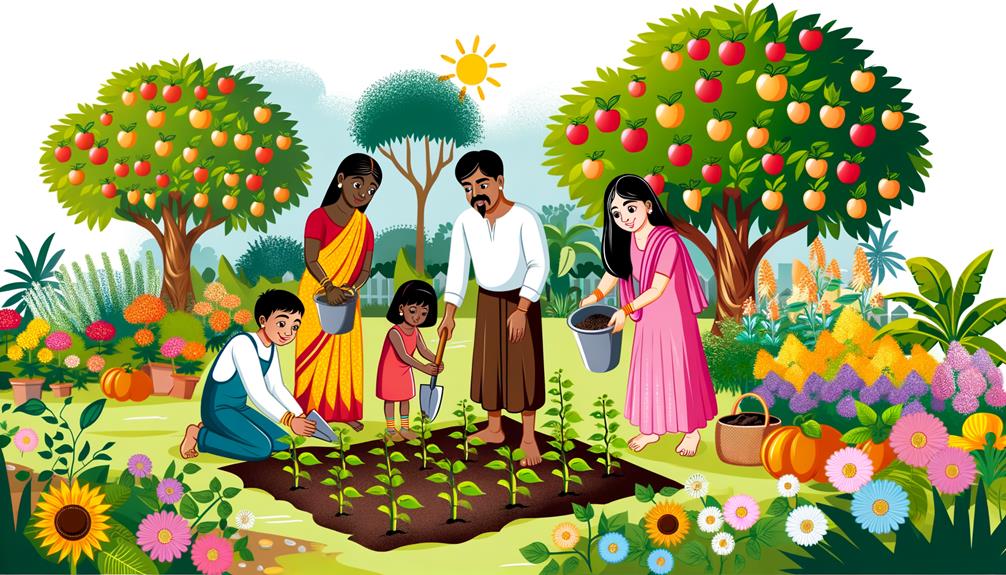
Applying the biblical directive to ‘be fruitful and multiply‘ on a personal level involves a careful consideration of one’s own values, circumstances, and the broader implications of this ancient mandate in today’s world.
Scripturally rooted in Genesis 1:28, this command historically emphasized procreation and fulfilling God’s creation plan. Today, its application may extend beyond mere physical reproduction.
One must reflect on spiritual and communal fruitfulness—cultivating virtues, nurturing relationships, and contributing positively to society. Individuals should weigh personal readiness, resources, and ethical considerations, acknowledging that ‘multiplying’ can mean fostering growth in others through mentorship or service.
The essence of this mandate, consequently, becomes a holistic call to enrich life in multifaceted, meaningful ways.
Conclusion
The phrase ‘be fruitful and multiply,’ originating from Genesis, juxtaposes the sacred mandate for human procreation with broader theological imperatives.
Scriptural analysis reveals layers of meaning, from immediate family growth to covenantal blessings.
Historically, it underscores societal norms and divine expectations in ancient contexts.
Theologically, it intertwines physical procreation with spiritual fecundity.
Modern interpretations balance traditional moral implications with evolving societal values, demonstrating its enduring relevance and multifaceted applications in contemporary discourse.






